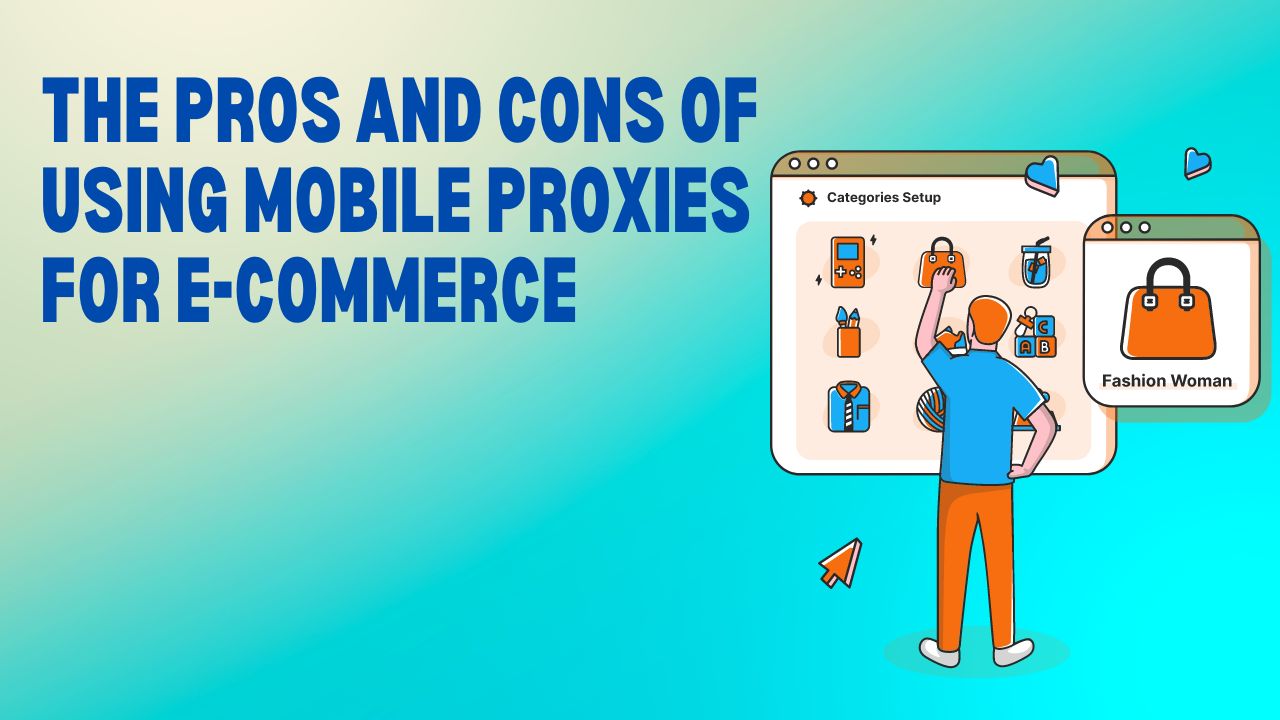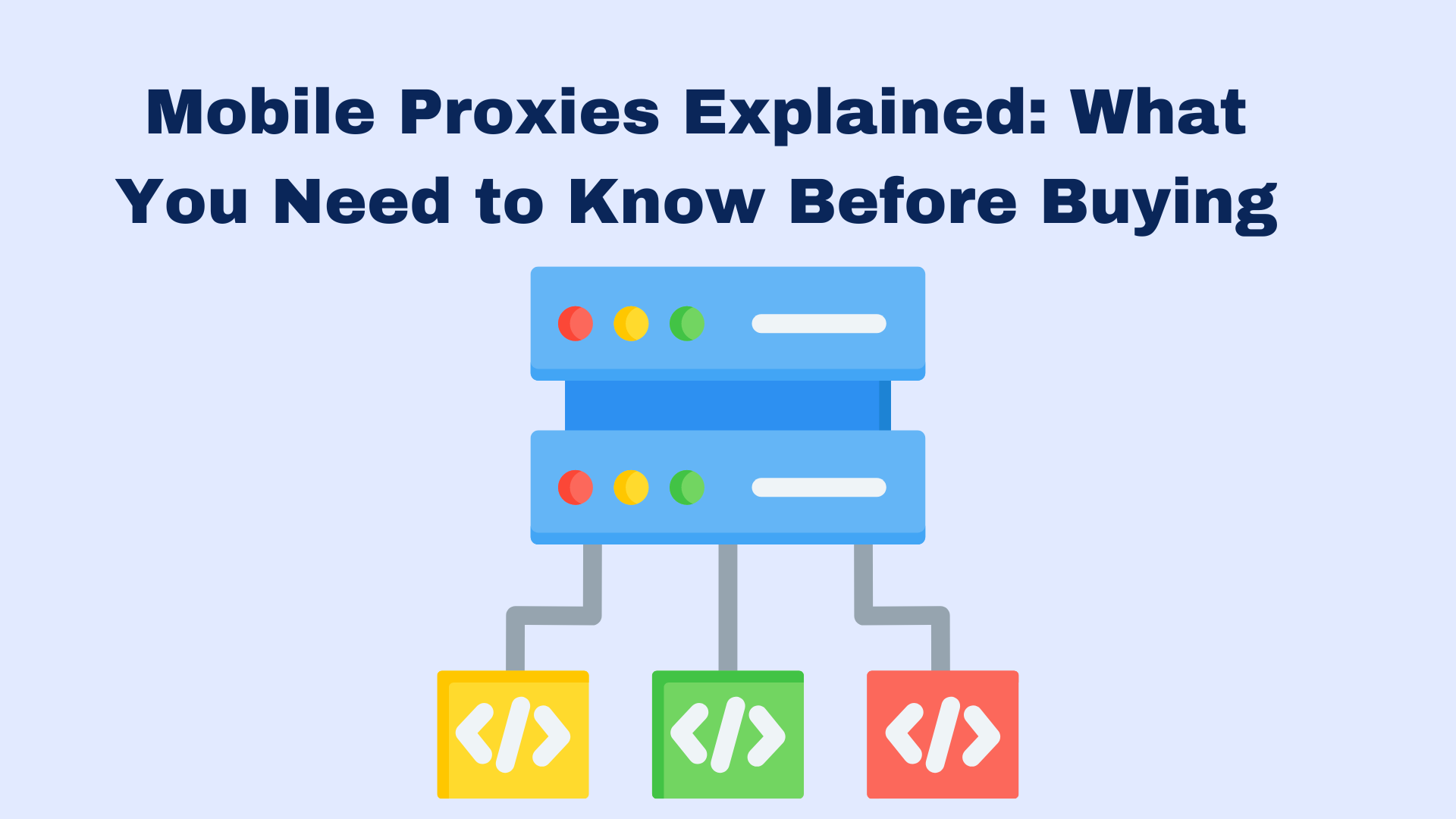In today’s highly competitive e-commerce landscape, businesses are constantly looking for ways to stay ahead. One of the strategies gaining popularity is the use of mobile proxies. Mobile proxies can be invaluable for various e-commerce tasks such as data scraping, price monitoring, competitor analysis, and more. However, like any other tool, they come with their own set of advantages and disadvantages. In this article, we’ll delve into the pros and cons of using mobile proxies for e-commerce to help you decide if they are the right fit for your business strategy.
What Are Mobile Proxies?
Mobile proxies are IP addresses assigned by mobile carriers (such as 4G, 5G networks) to their users. These proxies route internet traffic through mobile devices, making the requests appear as if they are coming from real mobile users rather than from centralized servers. This feature makes mobile proxies more trusted by websites compared to residential or data center proxies, which is particularly beneficial in the context of e-commerce.
Pros of Using Mobile Proxies for E-Commerce
- High Trust and Reduced Risk of Blocking: E-commerce platforms are increasingly vigilant about automated activities such as scraping or frequent data requests. Mobile proxies, which use IP addresses from mobile carriers, are generally perceived as genuine user traffic. This reduces the likelihood of IP bans or blocks when performing activities like price monitoring or data scraping.
- Improved Anonymity and Privacy: Mobile proxies offer a high level of anonymity since every request looks like it comes from a different mobile device. This makes it difficult for e-commerce platforms to track and block users based solely on their IP address, allowing for safer data extraction, price monitoring, and competitor analysis.
- Effective for Price Monitoring and Data Scraping: One of the key strategies in e-commerce is monitoring competitor prices, tracking inventory, and understanding market trends. Mobile proxies allow businesses to scrape data from competitor websites without being easily detected or blocked, enabling them to make informed pricing and inventory decisions.
- Geo-Targeted Market Research: Mobile proxies enable e-commerce businesses to browse websites from different geographical locations. This is particularly useful for monitoring regional pricing, understanding local competition, or viewing how websites appear to users in various areas, which is crucial for crafting localized marketing strategies.
- Support for Automation Tools: E-commerce businesses often use bots or automation tools for tasks like account creation, automated purchases, or frequent inventory checks. Mobile proxies enhance the effectiveness of these tools by mimicking natural user behavior, reducing the risk of detection, and preventing potential bans.
- Ad Verification and Compliance: For e-commerce companies running digital ad campaigns, mobile proxies provide the ability to verify how their ads are displayed in different regions. This ensures that the ads are served correctly and allows the detection of ad fraud, helping businesses maintain advertising compliance and effectiveness.
Cons of Using Mobile Proxies for E-Commerce
- Higher Costs: Mobile proxies tend to be more expensive than residential or data center proxies due to the higher trust and anonymity they offer. This can be a significant barrier for smaller e-commerce businesses with limited budgets.
- Limited Bandwidth and Slower Speeds: Mobile proxies often come with bandwidth limitations and might have slower speeds compared to data center proxies. For e-commerce businesses that need to scrape large amounts of data quickly or run multiple automated processes, this can be a disadvantage.
- Risk of Misuse and Ethical Concerns: While mobile proxies provide high anonymity, they can be misused for unethical practices, such as unauthorized data scraping, spamming, or violating website terms of service. E-commerce businesses must use proxies responsibly and ethically to avoid legal consequences and maintain a good reputation.
- Complex Configuration and Management: Setting up and managing mobile proxies can be more complex than using residential or data center proxies. They often require more advanced configuration to ensure proper IP rotation and management, which may necessitate hiring specialized IT staff or investing in additional software solutions.
- Dependence on Quality of Proxy Provider: The effectiveness of mobile proxies largely depends on the quality of the proxy provider. Low-quality providers may use IPs that have already been flagged or recycled, increasing the risk of bans and rendering the proxies less effective.
- Potential for IP Spoofing: Some less reputable providers might use IP spoofing or recycle IP addresses, which can lead to your IP being banned if it was previously used for malicious activities. This emphasizes the importance of choosing a reliable proxy provider.
Best Practices for Using Mobile Proxies in E-Commerce
- Choose a Reputable Proxy Provider: Ensure that the provider offers high uptime (99.9% or above), fast speeds, a large pool of IP addresses, and positive customer reviews. A reputable provider is crucial for minimizing the risks associated with mobile proxies.
- Implement Proper IP Rotation: Use mobile proxies that allow customizable IP rotation settings to mimic natural user behavior. This helps avoid detection and blocks when scraping data or monitoring prices.
- Monitor Account Activities Regularly: Keep track of the performance of your e-commerce tasks to detect any unusual activities or warnings from websites. Adjust your proxy settings and strategies accordingly to prevent bans or suspensions.
- Avoid Overloading Proxies: Although mobile proxies provide a high level of anonymity, overloading them with too many accounts or requests can still lead to detection. Distribute tasks across multiple proxies to minimize risks.
- Maintain Ethical Standards: Ensure that all data scraping, price monitoring, and other activities comply with legal and ethical standards to avoid potential penalties or legal issues.
Top Mobile Proxy Providers for E-Commerce
- Smartproxy: Known for its reliability and user-friendly interface, Smartproxy offers a range of mobile proxies with high uptime and fast speeds, making it an excellent choice for e-commerce businesses.
- Oxylabs: Provides a vast pool of mobile proxies with advanced features like customizable IP rotation and geo-targeting, making it suitable for businesses that require precise targeting and data scraping capabilities.
- Bright Data (formerly Luminati): A leading proxy provider, Bright Data offers robust mobile proxies with flexible pricing plans and advanced targeting options, making it ideal for both small and large-scale e-commerce operations.
- Soax: Offers secure and fast mobile proxies with extensive location coverage and flexible rotation policies, making them a solid choice for e-commerce professionals looking for budget-friendly yet effective proxy solutions.
- ProxyEmpire: Specializes in 4G mobile proxies with customizable IP rotation settings, offering a tailored proxy experience for businesses looking to optimize their e-commerce strategies.



